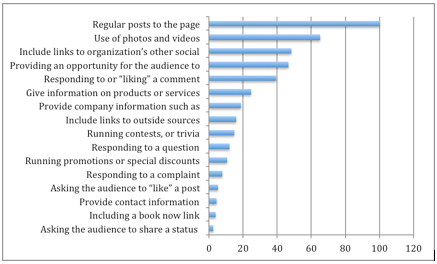Social Media Marketing is a Two-Way Street
In today’s digital landscape, resistance to social media, for personal or business use, is futile. Social media provides one of the best environments for engaging with your target market and finding out what makes them tick. It’s not about just posting promotions and hoping the sales come flowing in. In order to convert sales, you have to engage in dialogue and develop a level of trust with your consumer base. Best put, social media is not a one-way street.
Companies are investing significant amounts of cash into their social media efforts. If your company is one of these companies, you may as well be doing it correctly. Don’t just shout about your deals & promotions. Get to know your customers and develop a B2B or B2C relationship that is based on trust and understanding.
So where do you start? Stalk the competition. Find out who the leader is in your industry and study what they are doing well. The technical term for this is Benchmarking. Taking note of what others are doing is important to a company’s media strategies. If you aren’t keeping up, how can you ever hope to get ahead?
Companies in all industries are developing strategic marketing plans with a focus on social media. So if you work in an industry that is lagging behind, encourage your boss to be more social.
Specifically in the travel and tourism industry, social media is used quite often in your consumers’ decision making process.  For my master’s thesis at Clemson University, I examined how the accommodation sector used Facebook as a means to communicate dialogically with their consumers (study will be available in full soon).
For my master’s thesis at Clemson University, I examined how the accommodation sector used Facebook as a means to communicate dialogically with their consumers (study will be available in full soon).
So how are hotels using Facebook? Is it just another way to promote sales and new products, or are companies actually encouraging dialogue and talking back to their target market? In my study, my goal was to determine how 34 hotel brands, such as the Marriott and Super 8, used Kent and Taylor’s 5 dialogic principles.
Kent and Taylor’s principles encourage the use of something call the dialogic loop. This was in reference to companies actually responding to consumers and providing them with the ability to respond back. I know, what a crazy concept, right? Who would have thought it was a good thing to talk to your customers; the people that are keeping you in business?
Back to the academics! Stay with me here folks. Kent and Taylor’s 4 other principles were the generation of return visitors, conservation of visitors, ease of interface, and the usefulness of information. Criteria for each as modified for social media are listed below.
1. Usefulness of information:
- Include links to outside sources
- Use of photos and videos
- Provide company information such as location, history
- Provide contact information
- Give information on products or services offered
2. Conservation of visitors:
- Asking the audience to “like” a post
- Regular posts to the page
- Include links to organization’s other social media pages or website
3. Generation of return visits
- Running contests, or trivia
- Including a book now link
- Running promotions or special discounts
- Asking the audience to share a status
4. Dialogic loop:
- Providing an opportunity for the audience to respond
- Responding to a question
- Responding to a complaint
- Responding to or “liking” a comment
5. Ease of interface
- Similar setup for pages – Which is normally predetermined by the platform, in general all Facebook pages are set up the same
I could go on for days, but I will digress. To sum it up, the frequency for two-way (dialogic) communication was higher than previous studies, such as in higher education on Twitter, which found an average of 55.3% of tweets to be dialogic. My study produced numbers that were far higher. 97.9% of all the posts (761) used the dialogic principles. Most posts used between 2 and 3 principles in each post. The criterion for the usefulness of information was used the most frequent at 81.7%. Below are the percentages each criterion was used among all posts.
So what does all this mean in terms of practical use? When creating posts keep these principles in mind and try to use them. Building strong relationships with consumers is important for any business, and to do this the 5 principles should be followed frequently. Doing so will help create better dialogue, and stronger relationships with consumers. Facebook pages will turn into a place for conversation not just another way of advertising. After all you’d rather stay the night at your best friends, than a strangers, wouldn’t you?
Elizabeth Muckensturm – Social Media Coordinator




